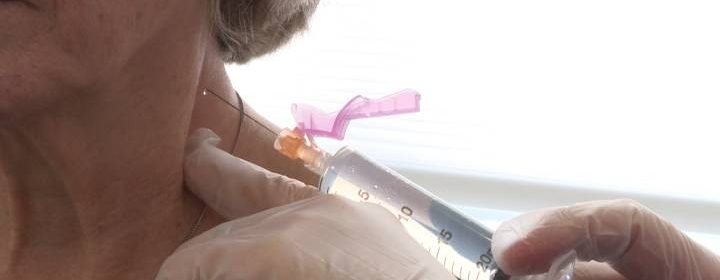Kingston doctor concerned health-care review could adversely affect chronic pain patients

The provincial government’s review of health care, with an aim of saving hundreds of millions of dollars, has Kingston doctor Gregory Murphy concerned.
He’s an anesthesiologist and works with people dealing with chronic pain.
The proposal to reduce nerve blocking injections to four visits a year with a maximum of four injections per visit isn’t realistic, Murphy says.
The nerve blocking shots are a local anesthetic and Murphy says that relief changes the way a muscle is firing.
“If you can flip the switch and turn it off then it doesn’t necessarily come back to spasming the same way,” he said.
For the treatment to work, Murphy says quarter annual visits don’t cut it.
“If we can get somebody a month between injections we consider that a victory.”
Each visit usually involves six to eight injections, says Murphy.
Joanne Lalonde has been a patient of Dr. Murphy’s for eight years and said her life is radically different today from what it was before her treatments.
“Dr. Murphy saved my life, he’s literally saved my life. I didn’t want to live prior to the injections. I didn’t think I’d be able to have a normal life.”
When Lalonde’s treatments first started she would visit Murphy at the Kingston Orthopedic Pain Institute twice a week.
She is now down to visits for injections every three weeks.
Pain is a constant part of Lalonde’s life but it is managed and she says she enjoys a decent quality of life.
The injections have also meant Lalonde has been able to reduce the amount of morphine she has to take.
The potential reduction leaves Lalonde concerned for her future and the thousands of other Ontario residents in the same position she’s in.
“I don’t want to slide back, I need these injections they’re going to keep me functional they’re going to keep me alive.”
Murphy questions how much the province would actually save with the injection cuts saying people with chronic pain will have to seek out other avenues in the health-care system.
“They’re going to end up going back to the emergency department, they’re going to go back to be treated with medications.”
Which is problematic with the concerns around opiate use, says Murphy.
“A lot of physicians are not comfortable providing opioid therapy for patients.”
Murphy says that also raises the spectre of self-medication.
“We still see patients that turn to alcohol and drugs off the street to try to manage their pain.”
The province is currently reviewing more than 20 OHIP funded services.
Sign up for our Health IQ newsletter
© 2019 Global News, a division of Corus Entertainment Inc.
Source: Read Full Article